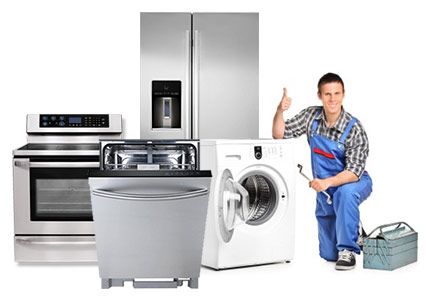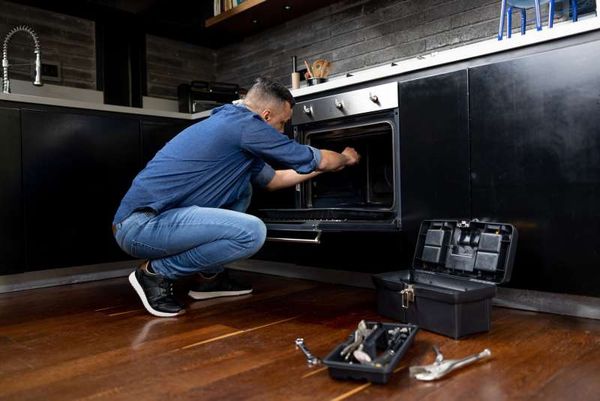Weird Washer Sounds Explained – Dependable Refrigeration & Appliance Repair Service Washer repair near me
Weird Washer Sounds Explained – Dependable Refrigeration & Appliance Repair Service Washer repair near me
Blog Article
The Ultimate Guide to Understanding Home Appliance Fixing in your home
When your refrigerator quits cooling down or your stove rejects to heat, it can really feel frustrating. Understanding device repair work at home can conserve you time and money. You'll discover to identify symptoms, make use of necessary tools, and adhere to an organized troubleshooting process. Before you begin, there are critical security preventative measures you require to take into account. What are the most usual troubles, and how can you repair them? Allow's discover the basics.
Common Appliance Troubles and Their Signs and symptoms
When your devices begin breaking down, it's necessary to identify the indications early on. Neglecting them can cause bigger concerns and costly repairs. If your fridge isn't cooling properly, you might observe warm areas or condensation forming. This can indicate a falling short compressor or an obstructed vent.Your dishwasher might reveal issues with unclean recipes or uncommon noises during cycles. If you hear grinding or clanking, it's time to investigate.A washing device that won't rotate or drain can leave you with soggy washing, suggesting a clogged drain or a malfunctioning pump.Lastly, if your oven's temperature level seems off or it takes forever to preheat, you could be dealing with a faulty thermostat. By remaining alert to these signs, you can deal with concerns before they intensify right into significant repair work.
Necessary Tools for Appliance Repair
When you're dealing with home appliance repair services at home, having the right devices is essential. Standard hand devices like screwdrivers and pliers will certainly aid you take apart and repair different devices, while electric testing devices ensure you're working safely with circuitry. Allow's discuss what you need to begin on your repair journey.
Basic Hand Tools
Having the right devices is important for reliable appliance repair service at home. Begin with a reputable screwdriver collection, consisting of both flathead and Phillips kinds, as screws prevail in home appliance setting up. Pliers are additionally vital; they aid with gripping, turning, and cutting cords or little parts. A set of needle-nose pliers can reach difficult situations conveniently. You'll need a great adjustable wrench for tightening or loosening nuts and bolts. An utility knife is convenient for cutting with packaging or insulation. Don't neglect a strong workbench or surface to securely organize your tools and parts. With these standard hand tools, you'll be well-prepared to deal with most appliance fixings that come your means.
Electric Screening Instruments
Together with standard hand tools, electric testing tools play a necessary role in appliance repair. These tools help you identify electrical concerns and guarantee appliances operate securely. A multimeter is important; it gauges voltage, current, and resistance, enabling you to pinpoint problems rapidly. A non-contact voltage tester is an additional must-have, allowing you spot live wires without making direct call, boosting your safety and security. Secure meters are great for measuring existing circulation in cords without detaching them, saving you effort and time. In addition, circuit testers can quickly check if outlets are working appropriately. By utilizing these tools, you'll simplify your troubleshooting process and enhance your fixing skills, making appliance maintenance a whole lot less complicated.
Step-by-Step Guide to Diagnosing Appliance Issues
When your device acts up, it can be aggravating, but diagnosing the concern does not have to be frustrating. You'll learn to identify usual issues and use effective fixing methods. Let's walk with the steps to get your appliance back in functioning order.
Typical Appliance Troubles

Fixing Strategies Explained

Fixing Major Cooking Area Appliances: A Closer Look
Have you ever before wondered exactly how to deal with common problems with your kitchen area home appliances? Fixing major kitchen appliances like refrigerators, ovens, and dishwashers can be much easier than you assume. Begin by identifying the trouble-- whether it's a refrigerator not cooling or an oven that will not warm. Often, an easy reset or examining the source of power can resolve the issue.For fridges, clean the condenser coils and inspect the door seals. If your oven's not home heating, examine the heating element and thermostat. Dishwashers could just require a tidy filter or a reset to get them back in action. Always unplug the home appliance prior to diving into repair services to ensure your safety.Don' t check my blog fail to remember to consult the customer handbook for specific troubleshooting ideas connected to your model. With a little bit he said of persistence and the right devices, you can confidently take on appliance fixings and save money at the same time!

Fixing Washing Devices: Tips and Techniques
When your laundry home appliances start breaking down, it can feel overwhelming, however troubleshooting them does not need to be a headache. Beginning by examining the power supply. Confirm the appliance is connected in and the electrical outlet is working. Next off, inspect the door or lid button; a faulty switch can avoid the machine from operating.For washing machines, if it's not spinning, inspect for out of balance lots. Rearranging the clothing might resolve the concern. If your clothes dryer isn't heating, clean the dust filter and check the air vent for blockages.Listen for uncommon sounds; they can indicate an issue. If your device is dripping, check the pipes for splits or loosened links. Document any error codes displayed on electronic displays, as they can guide you in determining the problem. Seek advice from the individual manual for specific troubleshooting pointers connected to your model.
Security Preventative Measures to Take During Services
Before you begin any type of device repair services, it's vital to focus on safety and security to stop mishaps or injuries. First, unplug the appliance or shut off the circuit breaker to ensure no power reaches it while you function. Use shielded tools to minimize the danger of electrical shock. Wear safety goggles and handwear covers to secure on your own from sharp sides or debris (Maytag Washing machine repair Dependable Refrigeration & Appliance Repair Service).Make certain your office is clean and well-lit, so you can see what you're doing. Keep kids and pets away from the location to prevent distractions and prospective dangers. If you're dealing with gas home appliances, be extra careful; look for leakages before proceeding.Take your time, and don't hurry via repairs. If you really feel unpredictable concerning any type of step, it's far better to stop and research than to think. Complying with these preventative measures will assist produce a much safer setting for your DIY home appliance repair work job
When to Call a Specialist for Assistance
Just how do you recognize if it's time to call in a professional for appliance repairs? If you've attempted standard troubleshooting without success, it's a clear indication. If your device still will not start or shows unusual noises after resetting it, don't hesitate to seek professional help.When you see leakages, smoke, or burning smells, prioritize safety and security and call a pro right away. These problems can cause more substantial damage or pose threats to your home.Also, if your appliance is under service warranty, speaking to an expert is usually the most effective path. They can ensure that repair services will not invalidate your guarantee, saving you cash in the long run.Finally, if you're unsure or check my site uncomfortable with intricate repair work, it's a good idea to leave it to the professionals. Remember, tackling complex problems without the best experience can bring about expensive errors. Depend on an expert when doubtful!
Regularly Asked Concerns
How Can I Avoid Device Issues in the Future?
To avoid appliance problems in the future, you ought to perform normal maintenance, check for damage, clean filters, and stay clear of overloading. Staying aggressive will certainly assist prolong their lifespan and maintain them running smoothly.
What Are one of the most Common DIY Home Appliance Repair Work Mistakes?
You could neglect safety and security precautions, miss troubleshooting actions, or use inaccurate devices when attempting DIY device repair services. Hurrying the process or disregarding maker guidelines can cause more significant concerns and pricey mistakes. Remain patient and educated!
Just how Do I Know if a Component Needs Replacement?
You can tell if a part needs replacement by examining for unusual noises, leakages, or inconsistent efficiency. If the appliance battles to run correctly or shows visible damage, it's likely time for a replacement.
Can I Make Use Of Generic Components for Device Repairs?
Yes, you can utilize generic parts for home appliance repairs, but establish they work - Dependable Refrigeration & Appliance Repair Service Washing Machine Repair. Generic parts might save you cash, but they could impact efficiency or longevity, so consider your options carefully before making a decision
What Service Warranties Cover Home Appliance Fixes?
A lot of home appliance guarantees cover repair services for producing issues, yet they commonly omit damage from abuse. Examine your warranty terms very carefully, as some might require utilizing certified specialists and original components for protection to remain legitimate.
Report this page